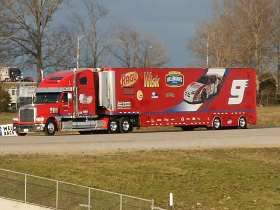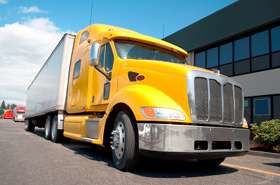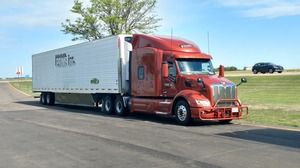OK So What's The Deal With Prime Lease?
Topic 11503 | Page 1
I promise you that if you start job hopping trying to find the perfect company that you will end up always chasing greener pastures. My best advice to newer drivers is just stay where you are at for a few years and REALLY do your research while you are getting good experience and then make your move to a good company. Walmart for example; their average driver makes approx $82,000 per year, but they are looking for top notch drivers with little to no job hopping. If you start hopping from job to job trying to find the perfect job the only thing you are going to accomplish is getting writers cramp when you fill out the job application and have to list all the info for every company you've worked for for the past 10 years. Trust me, I know.
I agree wholeheartedly with this.
If you cant pay cash..... you cant afford it .....
That's not necessarily true when you're starting a business. There is a common fallacy people have that borrowing money is a bad thing. But it's far more important to keep in mind if you're out of cash you're out of business. If you spend all of your cash buying things and then find you don't have enough cash left over to fund operations, you're sunk.
A sizeable percentage of small businesses that go out of business were actually profitable when they closed their doors. It wasn't that they couldn't turn a profit. The problem is that they didn't have enough cash to fund ongoing operations. Maybe that pizzeria you have is growing so fast you need larger ovens, more employees, and an upgraded exhaust system. Maybe your trucking business was rolling along fine until "Friday The 13th" hit and two drivers wrecked their trucks, an engine blew, and you lost one of your major contracts all in a three day period.
Businesses need cash to survive. If you take the approach of spending all of your cash in the beginning to stay out of debt you may find yourself "asset rich and cash poor" leaving you in a very tenuous situation.
I fail to see how it can be possible for there to be a 90 mile difference even if they are basing it off zip code to zip code
They also do shortest routing. Practical routing might keep you on the Interstates where the shortest route may cut through the backcountry on two lane roads. They use the shortest route from zip code to zip code.
Interstate:
Commercial trade, business, movement of goods or money, or transportation from one state to another, regulated by the Federal Department Of Transportation (DOT).
OWI:
Operating While Intoxicated

I'd never. I'd rather go to a company that's all company drivers like Pride before I ever lease a truck.
TheIles you are talking about is hub miles I don't think prime pays practical miles but zip to zip.

Well hub miles have cost me a nice chunk of change this week. 4 loads missing 90 miles each that I don't get paid for. Frustrating

Also, all of my friends from class say that they are making over 2gs a week lease. My best company check has only been 1250 with 3000 miles
Also, all of my friends from class say that they are making over 2gs a week lease.
Sam, this is exactly where a lot of people get fooled by these lease programs. Your friends are not telling you about their expenses, they are just telling you about their gross pay. And to tell you the truth they have not been doing it long enough yet to realize the reality of the whole situation. You can always do what you want, but do you really think Prime is willing to pay these lease guys a whole bunch of extra money when they are doing the same job you are? The lease programs take out the wildly uncontrollable variables in the equation for the company and lay those risks on the driver. Every lease operator I've ever spoken with thought they were making a killing when they first start. The company actually designs it that way. Then later on after the honeymoon is over, unless the driver is a really talented business person, or extremely lucky, the reality slowly dawns on them. Things start to happen like when they need to replace four super singles at once, or both steer tires at the same time. Guess who ponies up for that?
I suggest you hang in there, and keep in contact with some of those friends of yours. I promise you that in a year to eighteen months half of them will be so frustrated that they have gone to being a company driver, or they have quit all together.
Super Singles:
A single, wide wheel substituted for a tandem (two wheel) assembly. The main benefit of a super single is a reduction in weight and lower rolling resistance which provide better fuel economy. The disadvantage is the lack of tire redundancy (or a 'backup tire' in case of a blowout) from which tandem wheels benefit. A tire blowout is more dangerous with a super single and can not be driven on.
HOS:
Hours Of Service
HOS refers to the logbook hours of service regulations.
The reason the company wants everyone to go lease (and why you "appear" to make more money leasing), is that you're taking all the risk upon yourself and your credit financially. The companies love this as it means less expenses and more profit for them.
You must make the payment on the truck, which is a very sizeable portion of your income usually. When the truck needs maintenance or something breaks on a company truck, the company pays to get it fixed to get you rolling again. When its YOUR truck (leased or owned) then the bill falls on YOU to get it paid out of your pocket, which can be very expensive. If its your truck then you're paying for the fuel, oil, tires, and whatever else it needs (you may get a fuel surcharge from your company but it typically won't cover 100% of your fuel expenses), and also with your truck you run it as your business and so you have a lot more responsibility and liability. You must buy insurance, pay your taxes, etc.
Furthermore, if a company truck isn't moving, its costing them money. But if YOUR truck isn't moving, it costs YOU money, but the company doesn't suffer because its not their truck and they aren't having to pay for it. When you factor in all the expenses and liability of leasing or buying your own truck, the difference in pay goes away. You really don't make much IF ANY more than a company driver in the end, and you COULD end up broke instead.
I suggest reading this if you haven't already: So You're Thinking About Becoming An Owner-Operator?
And also: Lease-purchase: Sounds like a good deal, right?
That said, I believe there are certain reasons why some people might wish to purchase a truck, which have little or nothing to do with the money, but I do NOT think it is right for everyone or even for the majority of truckers, and CERTAINLY not for anyone without at least several years of significant trucking experience already in the industry.

I know how much leasing is hated here and I agree with you that it is a long term scam. Why else would they push so hard for it on new drivers. My plan is to switch to tanker for my last 6 months for the experience. I was also thinking about going lease for those months as well. If I can get a newer truck that's still under warranty then I should be able to make better money for the last 6 months I plan on being with prime. Everything I've read on other sites about primes tanker division is that they don't get a lot of miles so the only way to make money there is lease
HOS:
Hours Of Service
HOS refers to the logbook hours of service regulations.Everything I've read on other sites about primes tanker division is that they don't get a lot of miles so the only way to make money there is lease
Sam, that kind of statement is what tells me you really don't know what you are getting into. I assume you realize that we have quite a few lease drivers (most of them with Prime) in our forum. I promise you that each of them would agree with me when I tell you that turning miles is how you make money in this business. It makes no difference if you are getting paid percentage of the load, practical miles, or HHG miles. It doesn't matter if you are an owner/operator, in a lease agreement, or a company driver. The only way you stay above water is by putting out some decent miles. Bud, is one of our lease operators at Prime - I just noticed in another thread where he stated he hadn't been home in twelve weeks! He is trying to make some money, and I don't blame him, but he has got to turn some good miles to do that.

Well the difference between me and every other driver I've spoke to is how much money is enough money. Every other driver I I've talked to at prime wants to make 100,000 a year and they are willing to never be home to do it. My situation is different, I used to make 60k a year with a company that went out of business. So the 10 years I spent there bought me a house, cars, and even a son. So my house is paid for, cars are paid for, and my son is paid for. I don't have a ton of debt. I am frugal with my money so I don't need stay out 12 weeks to keep the lights on or pay for Xmas. I got into this business because the 10 years I spent at the brick yard took a toll on my body and I can't really do physical labor anymore. I can live fine on 800-1000 a week and I will gladly sacrifice pay to be home with my son. So if going lease gets me 1000 a week on low miles and lots of trips by home count me in. As soon as my year is up I will be local. I've already tested the waters and have a few offers. The only thing holding me back is taking on debt to prime for not finishing the year out. 2 of my friends that started with me have already moved on to local positions, 1 for 22 hourly and the other for 900 weekly.

Sam,
I started my trucking career with Prime, most of that leasing a truck. Unless Prime has changed dramatically, they never have pushed leasing on anyone. It is there as an option, but was never pushed. I have several friends still there at Prime, and they tell me a different story than what you are saying here about pushing to lease a truck.
I am not trying to start anything, just stating the facts as they have been presented by other folks there at Prime (some of them are instructors/trainers) that are telling a different story.
Now I will tell you, from my experience with Prime and others still there, is it possible to make better money as a lease operator? Yes it is, most of the time running a team operation to do it (and this is from my own experience). Not to say you don't make a little better as a lease driver over a company driver because you do (but usually not enough to make wild claims about 2K/week after expenses on a regular basis). I myself averaged about $1200 - $1400 a week on average as a solo driver, but also keep in mind that was before setting aside money for taxes (which by the way you as a lease driver have to pay the full amount). Most folks are not aware that when you get paid with a W-2, you are only paying 1/2 of your taxes, your employer pays the other 1/2. So I always estimate setting 30% aside for taxes, so that means on an average week I set $360 - $420 from that $1200 - $1400 aside, leaving $840 - $980/week take home. So now you have to ask yourself are they really taking home that much more than you are?
For me, the biggest draw at Prime to go lease is the little extra perks you have over a company driver. If I was to go back to Prime (that is a possibility) it would be as a lease operator because I enjoyed the little extras as a lease operator. Do you make more as a lease driver over company, it all depends on so many factors you as an individual do not have any control over usually.
Just though I would add a different perspective to this thread.
Ernie
New Reply:
New! Check out our help videos for a better understanding of our forum features

















Preview:
This topic has the following tags:
Prime Inc Leasing A Truck Truck Driver Salary Truck Driving Lifestyle







 TT On Facebook
TT On Facebook
I started this journey in June and have been solo driving since August. When I was done with tnt and upgrading they were pushing everyone to lease. I stuck to my guns and went company. I was the only one out of my group of friends who did. Now 4 months in I have been dispatched 4 times in a row this week on the same load to and from Kalamazoo MI to Murfreesboro TN. I have noticed multiple times that the dispatch miles are never as much as the actual miles but it has never really been that much. Well this run that I have been stuck on for a week now is a big difference. Dispatch is 488, actual miles are 574. Damn near 90 miles difference. I didn't say anything the first time but when I got dispatched right back I asked my fm about it and if I could get paid for them. He said he'd look into it. A day and a half later when I dropped and was dispatched right back again I asked again about the miles, seeing as I get paid by the mile, and he replied that I would not get the difference. That there system says 488 and that's what I am paid for and if it I didn't want to be paid btm I should switch to lease. REALLY? Why do they want everyone to be lease so bad?
Fm:
Dispatcher, Fleet Manager, Driver Manager
The primary person a driver communicates with at his/her company. A dispatcher can play many roles, depending on the company's structure. Dispatchers may assign freight, file requests for home time, relay messages between the driver and management, inform customer service of any delays, change appointment times, and report information to the load planners.TNT:
Trainer-N-Trainee
Prime Inc has their own CDL training program and it's divided into two phases - PSD and TNT.
The PSD (Prime Student Driver) phase is where you'll get your permit and then go on the road for 10,000 miles with a trainer. When you come back you'll get your CDL license and enter the TNT phase.
The TNT phase is the second phase of training where you'll go on the road with an experienced driver for 30,000 miles of team driving. You'll receive 14¢ per mile ($700 per week guaranteed) during this phase. Once you're finished with TNT training you will be assigned a truck to run solo.